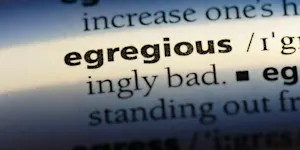What Makes This Word Tick
Nefarious is a deliciously dark adjective suggesting something wicked or villainous. It often appears in the context of describing deeds or plans that are not just bad but morally reprehensible. It’s a word any self-respecting mystery novel would be thrilled to include.
If Nefarious Were a Person…
Picture a classic movie villain: slick, smooth-talking, and perpetually shrouded in shadows. A nefarious person would wear a knowing smirk, emanating charm while plotting mischief. Always one step ahead, they'd be the person you love to hate.
How This Word Has Changed Over Time
Nefarious, hailing from the Latin "nefas" meaning "crime," has maintained its shady reputation for centuries. While the core of the word’s meaning has remained constant, its usage has become more prevalent in pop culture, describing both fictional villains and real-life misdeeds.
Old Sayings and Proverbs That Use Nefarious
While not found word-for-word in proverbs, nefarious aligns well with age-old warnings like "a wolf in sheep’s clothing," capturing the essence of hidden malevolence. It slips into the spirit of cautionary tales, urging us to watch for wolves hiding among us.
Surprising Facts About Nefarious
Did you know that the use of "nefarious" has increased steadily in books since the 1800s? It’s as if public fascination with mysterious and dark plots never wanes. It’s also frequently used in discussions of politics, where intentions can often seem shadowy at best.
Out and About With This Word
The thrill of playing detective is enhanced when "nefarious" slips into conversation at the book club. It’s not a word you’d expect to use at the grocery store, yet it’s perfect for adding a touch of drama when discussing less-than-ethical companies.
Pop Culture Moments Where Nefarious Was Used
Nefarious characters are staples in superhero movies, often with elaborate schemes against the protagonists. Notably, comic book dialogue loves this word—think of villains who describe themselves with relish, adding flair to their dastardly deeds.
The Word in Literature
Nefarious is at home in suspense novels, where every shadow conceals a secret. It often describes actions or characters in the works of authors like Agatha Christie, where motives are obscured until the final, thrilling reveal. It whispers from the pages, making readers shiver deliciously.
Moments in History with Nefarious
One of history's most nefarious acts could be the plot to assassinate Julius Caesar, where fellow senators concealed their intentions beneath cloaks of friendliness and duty. "Et tu, Brute?" captures the betrayal and nefarious plotting perfectly.
This Word Around the World
Around the globe, wicked deeds have many names. In France, you might hear "néfaste," while in Spanish, it's "nefasto." Each captures that sinister aura. Even body language can imply something nefarious, like a raised eyebrow or a sly smile hinting at mischief.
Where Does It Come From?
The roots of "nefarious" are delightfully ancient, stemming from Latin's "nefas," meaning something contrary to divine law or a transgression. It's a word that has journeyed through time, maintaining its law-defying edge.
How People Misuse This Word
Sometimes "nefarious" is misused to mean merely naughty or mischievous, when it actually implies something far more sinister. A prank may be naughty, but a scheme to exploit or harm would be nefarious.
Words It’s Often Confused With
Notorious: While both describe bad reputations, notorious is about fame for being bad, not inherently wicked deeds.
Infamous: Similar to notorious, it often leads to confusion with nefarious but lacks the underlying dark intent.
Villainous: This word does overlap but is more character-oriented, often used in storytelling.
Additional Synonyms and Antonyms
Synonyms include malevolent, villainous, and wicked. Antonyms encompass virtuous, honorable, and noble.
Want to Try It Out in a Sentence?
"Despite his charming demeanor, his nefarious plans soon came to light, sending shivers through the quiet town."
















